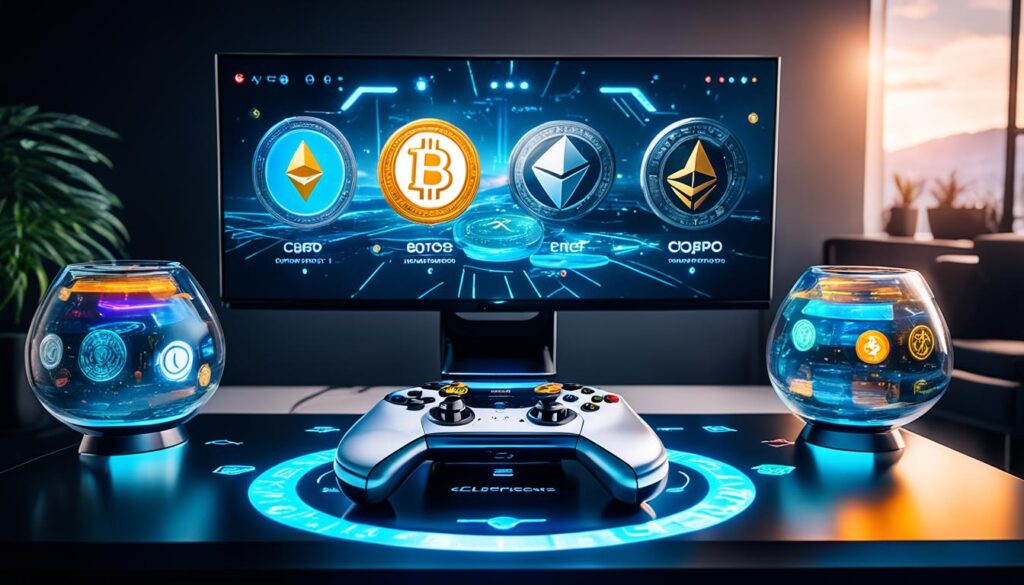Did you know that the gaming industry is exploring the potential of utilizing cryptocurrencies, with the emergence of crypto video games and the adoption of Non-Fungible Tokens (NFTs) in video games? This intersection between cryptocurrency and gaming is revolutionizing the industry and paving the way for exciting innovations.
Key Takeaways:
- Crypto video games are a new genre of gaming where players can win cryptocurrency as rewards.
- NFTs have become an investment opportunity, especially in the world of digital art.
- Virtual currencies, such as Simoleans and Gold, are commonly used in games for trading and purchasing in-game items.
- The integration of cryptocurrencies in gaming has the potential to transform the industry, offering benefits such as enhanced security, transparency, and global accessibility.
- While there are similarities between NFTs, Bitcoin, and virtual assets in gaming, there are also notable differences between the existing NFT/crypto ecosystem and the gaming currency world.
The Impact of Cryptocurrency on Metaverse Gaming
In recent years, the integration of cryptocurrency in Metaverse gaming has revolutionized the digital landscape, ushering in a new era of immersive and decentralized gaming experiences. Metaverse gaming refers to a virtual universe where players can interact and engage with one another in a shared digital space. In this metaverse, virtual assets are becoming increasingly valuable, with players able to buy, sell, and trade them using cryptocurrencies as a medium of exchange.
Blockchain technology, the underlying technology behind cryptocurrencies, plays a crucial role in ensuring transparent and secure transactions within the Metaverse. This technology enables the ownership of in-game items to be represented as non-fungible tokens (NFTs), which are unique and indivisible digital assets. NFTs provide players with true ownership of their virtual assets and grant them the ability to prove the authenticity and rarity of their items.
The tokenization of in-game economies through the use of cryptocurrencies brings new dimensions of efficiency, transparency, and security to the gaming industry. With cryptocurrencies serving as native currencies within certain Metaverse ecosystems, players can earn, spend, and exchange digital currencies in virtual worlds. This opens up a world of opportunities for players to monetize their gaming skills and assets, blurring the lines between virtual and real-world economies.
Furthermore, the decentralized nature of the Metaverse empowers independent game developers to create and deploy games without the traditional gatekeepers of the industry, reducing dependence on publishers and enabling greater creativity and innovation. Smart contracts, which are self-executing contracts with the terms of the agreement directly written into code, automate various processes within Metaverse gaming, ensuring transparency, fairness, and trust among players.
However, the integration of cryptocurrency in Metaverse gaming is not without its challenges. Scalability, interoperability, and regulatory uncertainties are some of the key hurdles that need to be addressed for the seamless integration of cryptocurrencies into the Metaverse. Scalability refers to the ability of the blockchain network to handle a large number of transactions in a timely manner, while interoperability focuses on the compatibility between different blockchain networks. Regulatory uncertainties surrounding cryptocurrencies and blockchain technology also pose challenges, as governments around the world develop frameworks to govern these emerging industries.
“The integration of cryptocurrency in Metaverse gaming has the potential to reshape the gaming industry, paving the way for a new era of decentralized and player-owned economies.”
– Anonymous gaming industry expert
Despite these challenges, the impact of cryptocurrency on Metaverse gaming is undeniable. By leveraging the power of blockchain technology, cryptocurrencies are transforming the way players interact, transact, and own assets, creating a more immersive, transparent, and economically vibrant gaming ecosystem. As technology evolves and regulatory frameworks mature, we can expect further innovation and collaboration between the cryptocurrency and gaming industries, pushing the boundaries of what is possible in the virtual realms of the Metaverse.
The Benefits and Challenges of Cryptocurrency Integration in iGaming
Cryptocurrency integration has brought numerous benefits to the iGaming industry. Bitcoin, in particular, has been widely adopted as a form of payment in online casinos and sports betting platforms. This adoption has opened up new opportunities for players to engage in transparent and provably fair gaming.
The integration of cryptocurrencies ensures that game outcomes are tamper-proof and verifiable by players. Through blockchain technology, the fairness of the games can be independently verified, increasing trust and eliminating skepticism in online gambling.
Furthermore, cryptocurrency integration in iGaming enhances security and anonymity. Transactions are encrypted and decentralized, minimizing the risk of data breaches and unauthorized access. Players can enjoy the benefits of enhanced privacy while engaging in their favorite iGaming activities.
Another advantage of cryptocurrency integration is the accessibility it provides to global markets. Traditional payment barriers, such as currency conversion and restrictions, are eliminated, allowing players from all corners of the world to experience iGaming platforms seamlessly.
However, with great potential comes challenges. Regulatory uncertainties surrounding cryptocurrencies pose a hurdle to their widespread adoption in the iGaming industry. As technology evolves and regulatory frameworks mature, collaboration between the two industries can pave the way for innovative solutions to address these challenges.
Key Benefits:
- Transparent and provably fair gaming
- Enhanced security and anonymity
- Accessibility to global markets
As the iGaming industry continues to evolve, cryptocurrency integration has the potential to revolutionize the way players engage in online gaming, providing a secure, transparent, and accessible platform for players worldwide.

Conclusion
Cryptocurrency integration has revolutionized the gaming industry, creating new possibilities and opportunities for players and developers alike. The convergence of cryptocurrency and gaming has paved the way for exciting innovations such as crypto video games and the tokenization of in-game economies.
With the rise of the Metaverse, players can now experience immersive virtual worlds where they can buy, sell, and trade virtual assets using cryptocurrencies. This not only enhances transparency and security but also empowers independent game developers to unleash their creativity without traditional limitations.
In the realm of iGaming, the adoption of cryptocurrencies has brought transparency, provable fairness, and enhanced security to online casinos and sports betting platforms. However, regulatory challenges and price volatility remain obstacles to wider cryptocurrency adoption in the iGaming industry.
The relationship between cryptocurrency and gaming is dynamic, constantly evolving, and holds immense potential for further collaboration. As technology progresses and regulatory frameworks mature, we can expect to see even more exciting developments and innovations in the fusion of cryptocurrency and gaming.

Leave a Reply